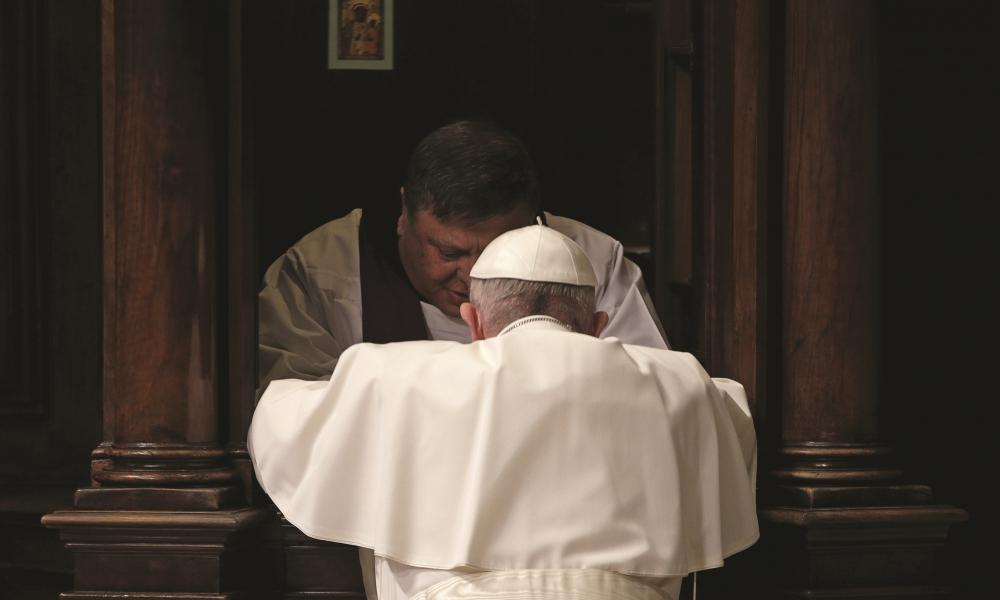
What Do You Do When Someone Asks Why We Have to Confess Our Sins to a Priest?
In 2017, Theology 101 is focusing on the topic of evangelization. Specifically, the task is to offer some ways of approaching various questions Catholics may encounter from co-workers, family and friends regarding the practice of the faith. Of course, we must remember that nothing can replace the power of witnessing to the Good News through our own actions and words, combined with our willingness to accompany others on their faith journey.
The Question: What do I say when someone asks me why we have to confess our sins to a priest? They want to know why we can’t go directly to God.
Healing the whole person
Often, the best way to engage this kind of question is to ask a question of your own that will help to ground your eventual response in shared experiences. For example, you might ask the questioner if they have ever known someone who wanted to avoid visiting the doctor when they were ill, or the dentist no matter how much their tooth hurt? Perhaps such a person might have reasoned with themselves, “God knows what is wrong with me. I can go directly to God, who can heal me should it be his will. After all, it is God alone who can heal anyway.”
While this is certainly true, the person might actually be avoiding healing because they are really scared of going to the doctor for fear of the pain of the treatment and what it might mean for their life. This fear keeps them from acknowledging the truth that, while God can directly heal them, God is offering to heal their physical body precisely through the vocation of the physician and all those in the medical profession – because this is what they need as human beings, a body and a soul.
And so why a priest?
If you can get the questioner reflecting on this experience, you can then begin addressing their question. You can point out that, as in the case of healing a physical ailment, only God can forgive sins. However, in the same way that God offers healing to the body through the physician, God forgives us (heals us and restores us to communion) precisely through the vocation of the priesthood – because this is what we need as human beings – a soul and a body.
Jesus Christ, by virtue of his divine authority, has given this power to some to exercise in his name because of his desire that the Church be “sign and instrument of the forgiveness and reconciliation that he acquired for us at the price of his blood.” (CCC 1442) To this end, Jesus entrusted the power of the absolution of sins to his apostles. This power passed principally to the bishops, who are the successors of the apostles and the visible head of a particular Church. Priests, who are a bishop’s collaborators, are able to exercise this power in Jesus’ name “to the extent that they have received the commission either from their bishop (or religious superior) or the pope, according to the law of the Church.” (CCC 1462)
That for which we were made
The motivation for this is not based on any need God has, but our needs given our reality and destiny. For instance, the first paragraph of the prologue to the Catechism of the Catholic Church teaches us that God created us freely and out of love for eternal life in communion with God. In other words, we are made for communion with the Blessed Trinity. The implication is clear: if we were made for communion, then we will only be whole (healed) if we live in harmony with this end. One way we have come to understand what this means practically is by using the image of the mystical body of Christ. Christ, who is in perfect communion with the Father, is the head of his body, the Church. The Church, to be healthy or whole, must remain in communion with Christ, her head. She can only do this because of the indwelling Spirit, who is in perfect communion with the Son and the Father. Finally, each of the members of the Church are called to remain in communion with the Church through the same power of the Spirit, who carries the Church into communion with the Son and the Father.
The problem of sin
Sin, of course, is a rupture of the communion with God and each other to which we are all called. For sure, sin breaks our personal communion with God. Consequently, going directly to God for forgiveness of sin is a good and should always be encouraged.
However, at the same time, sin damages our communion with the Church, thereby impacting the body’s communion with her head. This is because sin never is simply personal in its impact. Sin always has a social consequence as well. Consequently, the healing of this rupture requires both reconciliation with God and Christ’s body, the Church. Hence, our need for the sacrament of reconciliation, which expresses and accomplishes liturgically this forgiveness of God and reconciliation with the Church.
In other words, try explaining it like this: We must be careful that our going directly to God for the forgiveness of our sins does not become a way of our avoiding responsibility for the damage caused by our sinfulness – of keeping our sin secret and in the dark so as not to be discovered, as though this somehow erases the very real consequences of sin.
For further reflection
Consider prayerfully reading the following passage from the Gospel of John (20:19-23):
On the evening of that first day of the week, when the doors were locked, where the disciples were, for fear of the Jews, Jesus came and stood in their midst and said to them, “Peace be with you.” When he had said this, he showed them his hands and his side. The disciples rejoiced when they saw the Lord. [Jesus] said to them again, “Peace be with you. As the Father has sent me, so I send you.” And when he had said this, he breathed on them and said to them, “Receive the holy Spirit. Whose sins you forgive are forgiven them, and whose sins you retain are retained.”
Reflection Question
1. What does this passage have to teach us about the connection between peace (wholeness, healing, communion) and the role of the priest in hearing confessions?
2. How might this passage help you explain why we have to confess our sins to a priest?
Evangelization Quiz
Which saint said the following? Go to your confessor; open your heart to him; display to him all the recesses of your soul; take the advice that he will give you with the utmost humility and simplicity. For God, who has an infinite love for obedience, frequently renders profitable the counsels we take from others, but especially from those who are the guides of our souls.
A. St. Augustine
B. St. Faustina
C. St. Francis de Sales
D. St. Thomas Aquinas
Answer: (C) St. Francis de Sales



